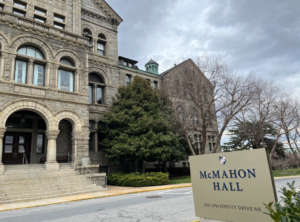The Controversy of Columbus

By Claire Prudhomme
American elementary schoolers are taught in class to sing “in 1492 Columbus sailed the ocean blue” and chant on the playground “the Niña, Pinta, and Santa Maria.” These ships brought gifts to the Americas from Europe; the Niña bringing with its explorers also brought mass genocide, the Pinta carried foreign diseases in the palms of the shipmate’s hands and the Santa Maria enslaved thousands of indigenous peoples.
According to the website Time and Date, Columbus Day was first celebrated in San Francisco in 1869 to commemorate Italian-American heritage and in 1937 Columbus Day became the national holiday celebrated today. Columbus Day is controversial due to a large number of deaths of indigenous people that were under the direct actions of Columbus himself. It is also argued that Columbus’ discovery of North America is very limited as he only journeyed into some parts of the Carribean. It is also argued that Columbus shouldn’t be celebrated in North American, as he only journeyed into some parts of the Carribean.
Columbus’s treatment of the Natives is the main source of all the controversy surrounding the celebration of this holiday. He instituted slavery in the new world and sent some of the indigenous people out of the country, working them until they died. e used cruel and unusual punishments to torture them.
According to Professor Samuel Fisher, when Columbus first came to the Americas, it is estimated that there were nearly 200,000 to 300,000 Taino people, indigenous people of the Carribean and Florida. After two years of Columbus’ inhabitants, around 125,000 of them died. Columbus is viewed as a symbol of European colonization in the Americas which is why Native groups have fought so hard to end the celebration of this holiday.
A problem America is facing today is a large attempt to cover up its past wrongdoings and the controversial parts of history. In the end, America is a result of years of colonization, slavery, racism, and destruction of culture.
In addition to historical help for this article, Fisher commented in reference to our modern political issues. Columbus’ exploitation is one of the same pages of the story going on now.
“It doesn’t take great powers of observation to realize that questions of race and the consequences of unchecked exploitation of the planet’s resources are making headlines.” Fisher said “And Columbus has much to tell us about both of those things. It is not a comforting story, but it is an important one.”







